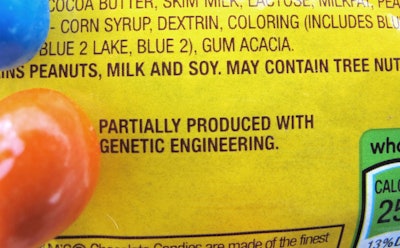
|
WASHINGTON (AP) — Senators have a bipartisan deal to require labeling of genetically modified ingredients nationally, a week before a labeling law in Vermont goes into effect. The deal announced Thursday by the top Republican and Democrat on the Senate Agriculture Committee would require the nationwide labeling of genetically modified organisms, or GMOs, in packaged foods for the first time. But it would be more lenient than Vermont's law, allowing food companies to use a text label, a symbol or electronic label accessed by smartphone. Vermont's law would require items to be labeled "produced with genetic engineering." The agreement couldn't become law before Vermont's law kicks in July 1, since the House is on vacation until July 5. Legislation passed by the House would make the labeling voluntary, but that measure stalled in the Senate earlier this year. Since then, Sens. Debbie Stabenow, D-Mich., and Sen. Pat Roberts, R-Kan., have worked to find a compromise, saying a national solution is needed in the face of separate state laws. The food industry has lobbied to block Vermont's law, arguing that GMOs are safe and the labels could be costly for agriculture, food companies and consumers. The industry's main lobbying group, the Grocery Manufacturers Association, said it is backing the senators' deal. The group has opposed mandatory labeling nationwide but advocated for electronic labels in negotiations. "This bipartisan agreement ensures consumers across the nation can get clear, consistent information about their food and beverage ingredients and prevents a patchwork of confusing and costly state labeling laws," said Pamela Bailey, president of that group. The Agriculture Department appeared to endorse the legislation, as well, issuing a statement encouraging members of the House and Senate to move quickly on the deal. The bill would give the USDA two years to write the labeling rules. Two top Vermont officials immediately opposed it. Gov. Peter Shumlin criticized the two-year delay and pre-emption of Vermont law, among other provisions. Sen. Bernie Sanders said he would do "everything I can" to defeat it. "People have a right to know what is in the food they eat," Sanders said. Genetically modified seeds are engineered in laboratories to have certain traits, such as resistance to herbicides. The majority of the country's corn and soybean crop is now genetically modified, with much of that going to animal feed. Corn and soybeans also are made into popular processed food ingredients such as high-fructose corn syrup, corn starch and soybean oil. The food industry says about 75 percent to 80 percent of foods contain genetically modified ingredients. The Food and Drug Administration says they are safe, and there is little scientific concern about those GMO ingredients on the market. But advocates for labeling say not enough is known about their risks. Among supporters of labeling are many organic companies that are barred by law from using modified ingredients in their foods. Those advocates have fought state by state to enact mandatory labeling, with the eventual goal of a national standard. They have frowned on digital labels, saying they discriminate against people who don't have smartphones, computers or the know-how to use them. Groups that have advocated labeling criticized the deal. "This proposal falls short of what consumers rightly expect — a simple at-a-glance disclosure on the package," said Gary Hirshberg, chairman of the advocacy group Just Label It and the organic food company Stonyfield Farm. |






















